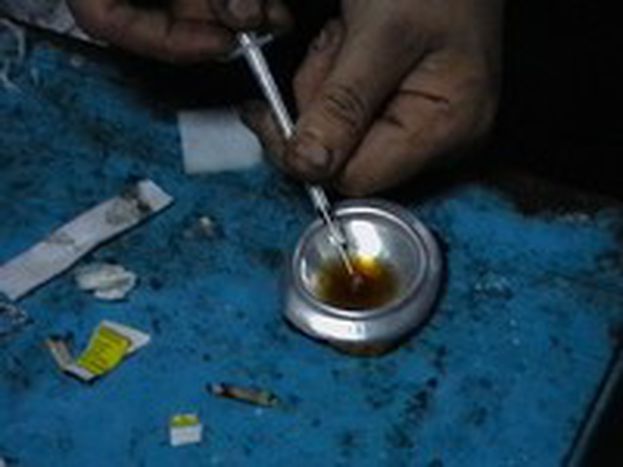
Tolerance or prohibition – do we have to decide?
Published on
Translation by:
 katy waterman
katy waterman
Could getting hold of crack cocaine or ice soon be as easy as buying a packet of aspirin? Courts of law are swaying ever more between suppressing the problem, tolerating it, and offering rehab support
Drug taking depends largely on drug trafficking, the main victims of which are poorer countries. It doesn’t take a genius to do the maths: 1 hectare of opium poppy flowers produces 1 kilo of morphine, which will earn the farmer $2,000. Mixed with acetic anhydride, the morphine will produce 1 kilo of heroin which will then be sold to a drug dealer for $200,000 who, in turn, will sell it to individual users for $2,000,000. But the North-South border between those countries who produce the drug and those who sell it is becoming increasingly blurred. In the streets of Bogota, La Paz or Kabul, a sharp rise in drug taking, particularly amongst teenagers, is now being witnessed.
Clashes and Disagreements
Arguments between those supporting and those against legislation have been sparked by confusion of terms. Legalisation is aimed at legalising drug taking whilst still continuing to punish those who sell and deal drugs. Legalisation will not, therefore solve the problem of contact between drug addicts and illegal drug networks.
Supporters of drug legalisation want to make the whole drugs business legal so that the state can control the entire chain of production and distribution. The state would then have the opportunity to steer drug users away from traffickers and dealers and provide them with better information on what is actually in the drugs. Just like the leaflets found inside medicine packs, the contraindications and dangers associated with its use would be clearly indicated. But this laudable well-intended supply of information won’t stop illegal trafficking of new products which aren’t monitored and are, thus, exempt from tax.
The problem with legalising drugs isn’t so much that it sends the “wrong” message to drug addicts, but that this message contradicts the idea of public health. Between stigmatisation and protection, drug addicts are viewed as either victims or offenders whichever way they turn. But it’s by reconciling the aims of reducing the risks and fighting crime that the anti-drug legislations must work towards.
Punish those behind the drug networks or those who take drugs?
The drug problem can only be viewed as a global problem. The example of the Netherlands, forced into being isolated on the international scene, is still fresh in our minds. If the policy of tolerance in Amsterdam has not sparked a rise in drug taking in the Netherlands, the country has, on the other hand, become a centre for drug trafficking and appears bound to have to adopt a stricter stance from now on.
The EU has its own role to play in drawing up a new global approach to the networks. But the two aims of its plan to combat drugs for 2005-2012 seem rather feeble: act upon the supply (the networks) and the demand (drug users). In the majority of EU countries (with the exception of Malta and Luxembourg) the majority of public spending allocated for the fight against drugs (between 68 and 75%) is spent on reducing supply. These anti drug-trafficking policies have varying degrees of effectiveness.
“The idea that the drug networks can be dismantled from the bottom, by reeling in the supply chain is unrealistic” maintains Tim Boekhout van Solinge from the Willem Pompe Institute at the University of Utrecht. “In France”, continues this criminology professor, “around 90% of arrests linked to drugs are of drug users and small-time dealers. It’s a symbolic policy, aimed at impressing: lots of charges, hardly any drugs seized in raids. In the Netherlands, on the other hand, the police concentrate on the larger drugs networks. This latter approach allows the Netherlands to seize large quantities of drugs.”
The object of the fight against drug-related crime is not clearly defined. Is it about crimes which have been committed whilst under the influence of drugs, crimes committed in order to pay for the habit, or violations of anti-drug legislation? The statistics only concern this last category, which neither facilitates trans-national comparisons, nor the establishment of effective policies.
Fragile therapies
With regard to the objective of reducing drug use, several experiments have been initiated. In medical environments treatment with opioide substitutions has been largely successful. More than half a million Europeans are thus receiving some sort of drug substitution. Methadone slowly reduces the cravings for heroin and is not dangerous in the small doses given for drug addiction treatment. In addition, methadone syrup reduces the likelihood of contracting hepatic problems and HIV. The result is that cases of AIDS amongst heroin addicts is at a low and injections into the vein are no longer the biggest risk factor for spreading the virus in Europe (at the moment it’s intimate heterosexual relations).
The availability of such treatment, however, is far from being commonplace. The 10 new Member States only represent just over 1% of those being treated with drug substitutions. And for those who use stimulants or cocaine, treatment options are very underdeveloped. Furthermore, one of the characteristics of drug use in Europe is taking different substances at the same time or “poly drug use”. In the fight for prevention and treatment, it is now necessary to take into consideration the interaction between toxic substances and psychoactive substances such as alcohol and tobacco.
To turn the tide we need to find a fair balance between health and public safety demands and a strict stance against drug trafficking. This means not resorting to incarcerating fragile populations, increasing social efforts and actions to prevent people becoming drug addicts and to help former drug addicts become part of the community once more, and standing strong against the drug networks.
Translated from Tolérer ou punir, il faut choisir


